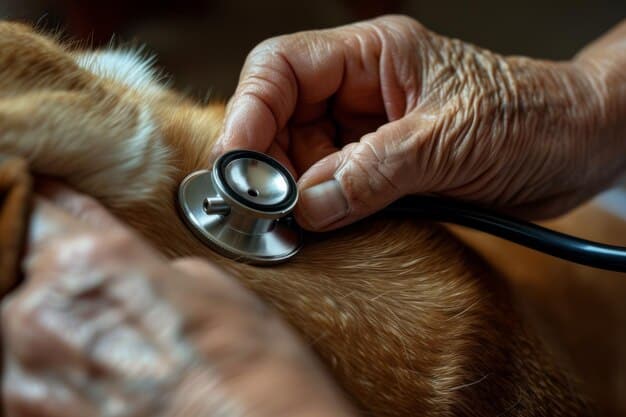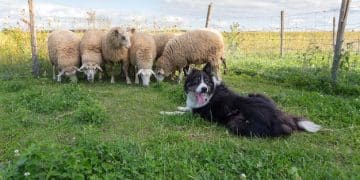Senior Dog Breeds in 2025: Profiles & Health Concerns in the US

Senior dog breeds in 2025 in the US will require specialized care due to age-related health concerns such as arthritis, cognitive decline, and heart conditions; understanding breed-specific predispositions helps owners provide optimal support and maintain their senior dogs’ quality of life.
As our canine companions enter their golden years, understanding their breed-specific needs becomes crucial. This article explores senior dog breeds and age-related health concerns in the US in 2025, helping you provide the best possible care for your aging friend.
Understanding Senior Dog Breeds: Breed Profiles and Age-Related Health Concerns in the US in 2025
Caring for a senior dog involves understanding the unique needs that come with age. Just like humans, dogs experience various age-related health concerns that can impact their quality of life. This article will delve into specific breed profiles and common health issues seen in senior dogs within the United States in 2025, providing valuable insights for pet owners.
By being informed about the potential health challenges and breed-specific predispositions, you can proactively address these issues, ensuring your senior dog enjoys a comfortable and fulfilling life. The information provided will cover common ailments such as arthritis, cognitive decline, heart issues, and more, offering strategies for prevention, early detection, and effective management.
Common Health Concerns in Senior Dog Breeds
As dogs age, they become more susceptible to several health issues. Recognizing these early can significantly improve your dog’s quality of life. Here are some of the most common age-related health concerns in senior dogs.
Arthritis and Joint Pain
Arthritis is a degenerative joint disease that causes pain, stiffness, and reduced mobility. It’s extremely common in older dogs and can significantly impact their daily activities.
Cognitive Decline
Also known as canine cognitive dysfunction (CCD), this condition is similar to Alzheimer’s in humans. Symptoms include disorientation, memory loss, and changes in behavior.
Heart Conditions
Heart disease is another prevalent issue in senior dogs, encompassing conditions like mitral valve disease and dilated cardiomyopathy. Regular checkups and early detection are vital.
- Early detection through regular veterinary check-ups.
- Weight management to reduce strain on joints.
- Providing comfortable bedding and gentle exercise.

Addressing these health concerns requires a proactive approach. Regular veterinary check-ups, a balanced diet, and appropriate exercise are crucial. Additionally, providing a comfortable and supportive environment can improve your senior dog’s overall well-being.
Popular Senior Dog Breeds and Their Specific Health Needs
Different breeds have varying predispositions to certain health conditions. Understanding these breed-specific risks can help you tailor your dog’s care to meet their individual needs. Here are some popular breeds and their common age-related health concerns.
Labrador Retrievers
Labradors are prone to joint issues like hip and elbow dysplasia, as well as heart conditions and certain types of cancer. Monitoring their weight and providing joint supplements can be beneficial.
German Shepherds
German Shepherds often suffer from hip and elbow dysplasia, degenerative myelopathy, and bloat. Regular exercise and a balanced diet are essential for managing these risks.
Golden Retrievers
Golden Retrievers are susceptible to heart conditions, cancer (especially lymphoma and hemangiosarcoma), and joint problems. Regular vet visits and a healthy lifestyle are crucial.
- Early detection through genetic testing.
- Proactive management of joint health.
- Being vigilant for signs of cancer.
Providing specialized care based on breed-specific risks is essential for maintaining your senior dog’s health. Working closely with your veterinarian can help you create a targeted care plan that addresses potential health issues before they become severe.
Dietary Considerations for Senior Dogs
A balanced diet is crucial for maintaining the health of senior dogs. As they age, their nutritional needs change, requiring adjustments to their diet to support their overall well-being. Here’s what to consider.
Adjusting Caloric Intake
Senior dogs often have lower energy levels and decreased metabolism, making them prone to weight gain. Reducing their caloric intake helps prevent obesity, which can exacerbate joint and heart problems.
Nutritional Supplements
Supplements like glucosamine and chondroitin can support joint health, while omega-3 fatty acids can help reduce inflammation and improve cognitive function. Always consult with your vet before adding supplements to your dog’s diet.
Easily Digestible Food
Older dogs may have difficulty digesting certain foods. Opting for high-quality, easily digestible ingredients can help prevent digestive issues and ensure they absorb essential nutrients efficiently.
Proper nutrition is a cornerstone of senior dog care. By adjusting their diet to meet their changing needs, you can help them maintain a healthy weight, support their joint health, and improve their overall quality of life.
Exercise and Activity for Senior Dogs
Maintaining an active lifestyle is crucial for senior dogs, but it’s important to adjust their exercise routine to accommodate their physical limitations. Here’s how to ensure your senior dog stays active and healthy.
Gentle Exercise
Avoid strenuous activities that put excessive strain on their joints. Opt for gentle walks, swimming, or light play sessions that allow them to move without overexertion.
Regular Activity
Consistent, moderate exercise helps maintain muscle mass, supports joint health, and improves cardiovascular function. Aim for daily activity sessions, even if they’re short and low-impact.
Mental Stimulation
Mental exercise is just as important as physical activity. Puzzle toys, training exercises, and interactive games can keep their minds sharp and prevent cognitive decline.

- Consult with your vet for a tailored exercise plan.
- Monitor your dog’s response to activity.
- Ensure a safe and comfortable environment for exercise.
Adapting your dog’s exercise routine to their age and physical condition is essential. By providing gentle, consistent activity and mental stimulation, you can help them maintain their physical and cognitive health throughout their senior years.
Creating a Comfortable Environment for Senior Dogs
As dogs age, their needs for comfort and security increase. Creating a supportive and comfortable environment can significantly improve their quality of life. Here are some key considerations.
Comfortable Bedding
Provide orthopedic beds that offer excellent support for their joints. These beds can alleviate pressure points and improve their sleep quality, which is crucial for overall health.
Accessibility
Make sure your senior dog can easily access their food, water, and favorite resting spots. Ramps or steps can help them navigate elevated surfaces, reducing strain on their joints.
Temperature Control
Senior dogs are more sensitive to temperature changes. Keep their environment at a comfortable temperature, avoiding extreme heat or cold, to prevent discomfort and health issues.
A comfortable environment can make a significant difference in your senior dog’s well-being. By providing supportive bedding, ensuring accessibility, and maintaining a comfortable temperature, you can help them feel safe, secure, and content in their golden years.
Regular Veterinary Check-ups and Preventative Care
Regular veterinary check-ups are essential for maintaining the health of senior dogs. These visits allow your vet to detect potential health issues early and provide preventative care to keep them healthy and comfortable. Here’s what to expect and why it’s important.
Increased Frequency
Senior dogs should have veterinary check-ups more frequently, ideally every six months. This allows for more thorough monitoring and early detection of age-related health concerns.
Comprehensive Examinations
During these check-ups, your vet will perform a comprehensive examination, including blood tests, urine analysis, and other diagnostic tests to assess their overall health and detect any underlying issues.
Preventative Care
Preventative care includes vaccinations, parasite control, and dental care. Maintaining these aspects of their health can prevent secondary complications and improve their overall well-being.
Proactive veterinary care is critical for senior dogs. Regular check-ups, comprehensive examinations, and preventative measures can help ensure they receive the necessary medical attention to live a healthy and fulfilling life. Remember, early detection and intervention can make a significant difference in managing age-related health concerns.
| Key Point | Brief Description |
|---|---|
| 🩺 Regular Vet Checks | Essential for early detection of health issues in senior dogs. |
| 🦴 Joint Health | Manage arthritis with supplements and comfortable bedding. |
| 🧠 Cognitive Function | Stimulate the mind with puzzle toys and gentle training. |
| 🍖 Diet Adjustments | Modify caloric intake and ensure easily digestible food. |
Frequently Asked Questions
▼
Common issues include arthritis, cognitive dysfunction (similar to Alzheimer’s), heart disease, kidney problems, and cancer. Regular veterinary check-ups are crucial for early detection and management.
▼
Manage your dog’s weight to reduce joint stress. Provide comfortable orthopedic bedding, administer vet-approved joint supplements like glucosamine, and engage in gentle, low-impact exercises.
▼
Signs include disorientation, changes in sleep patterns, decreased interaction, house soiling, and memory loss. Consult your veterinarian for diagnosis and management strategies.
▼
Reduce caloric intake to prevent weight gain, ensure easily digestible food, and consider adding joint or cognitive health supplements. Consult with your vet for a tailored dietary plan.
▼
Senior dogs benefit from more frequent vet visits, ideally every six months. This allows for thorough monitoring, early detection of health issues, and proactive preventative care adjustments.
Conclusion
Understanding the specific needs of senior dog breeds in 2025 within the US, including tailored care plans based on breed predispositions and regular check-ups, is crucial for ensuring a happy and comfortable life for your aging canine companion. Emphasizing proper nutrition, gentle exercise, and a supportive environment will greatly improve their overall well-being.





